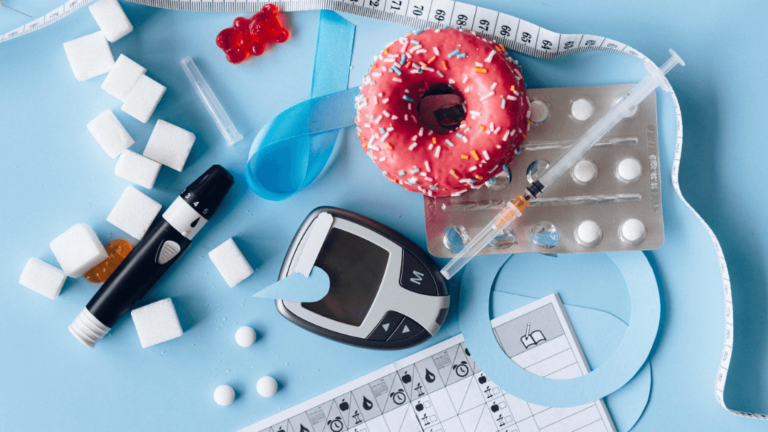Diabetes is a chronic health condition that has become a common issue among the world population. More than 10% of the world population has seen a rapid rise in diabetic symptoms among them including children, women, men, and older people. Therefore, people need to learn how to live with diabetes and take it seriously. Adopting healthy parameters means making healthier choices in terms of food intake, weight management, engaging in outdoor activity and lastly taking medicine on time.
There are three types of diabetes:
- Type 1: In type 1 diabetes, your body fails to produce insulin. Insulin is required to take glucose from the food and convert it into energy. Such conditions can be managed well only if the patient takes insulin therapy and other treatment. You can still live a normal life with a healthy lifestyle and a balanced diet. Type 1 diabetes can happen to anyone including children, teens, or adults.
- Type 2: Type 2 is the most common type of diabetes almost 80 to 90 percent of people have it. It is a condition where your body doesn’t use insulin properly and therefore can’t keep blood sugar at normal levels. Medication and insulin will be required to manage type 2 diabetes. However, type 2 diabetes can be prevented with healthy lifestyle changes such as weight management, balanced meal, and being active.
- Type 3: Type 3 diabetes is also known as Gestational Diabetes usually found in pregnant women. during pregnancy, some hormonal blocks cause insulin resistance that makes it difficult for the mother’s body to use insulin. This increases the risk of getting health problems for the baby. These babies are more likely to develop type 2 diabetes in their later life or be obese as children or teens. Usually, gestational diabetes goes away after the baby is born. But it’s important for the pregnant woman to work with her doctor to keep a check on her blood sugar level, have a meal on a set timetable, and do some physical activity. The treatment may require blood glucose testing and insulin injections.
Learn to manage your diabetes by bringing some adoptive lifestyle changes in your diabetic journey:
- Well Balanced Meal: A diabetic person needs to be very cautious of what food to be eaten, how much to be eaten and in what combination to be eaten. No food is restricted but made to a certain limit and proportion to consume only as much your body needs. The whole idea is to include healthy eating habits in your diet and limit certain foods that increase your blood sugar level. Include more green leafy veggies, fruits, whole grains, and lean meat to make a balanced meal.
Limiting carbohydrates and choosing a healthier version of carbohydrates such as brown rice, buckwheat, whole oats, chickpeas, beans, and lentils. Nonfat dairy products like unsweetened yogurt and skimmed milk.
Limit your salt intake as it increases the risk for high blood pressure. Instead, try including different herbs and spices that add extra flavor to make your meal flavorsome.
Consume less red and processed meat like bacon, sausages, beef, and lamb. They increase health problems instead include lean proteins like chicken, poultry, fish, and eggs. Plant-based proteins such as tofu, lentils, and hummus.
Consume more fruits and veggies in your diet. Fruits are good for diabetes people too as fruit contains natural sugar which is not harmful like added sugar or processed sugar. Include nutrient-rich veggies like broccoli, asparagus, celery, green beans, mushroom, and carrots.
Cut down added sugar intake, especially from tea or coffee, sugary drinks, energy drinks, and fruit juices. Cutting out added sugar helps to control blood sugar levels. You can always opt for a zero-calorie sweetener.
Be smart to make healthier choices and limit your portion size so that you don’t have to compromise your taste buds.
- Physical Activity: Physical activity or outdoor activity is an important part of diabetic management as it helps regulate insulin levels and control diabetes. It helps to bring down the blood sugar level. A 30 min of daily activity can include walking, some light exercise, yoga, and meditation. Exercise doesn’t always need to be hardcore strength training like gym or cross training. Physical activities for a diabetic person can also include simple tasks like housework, gardening, or stretching so that your muscle use glucose for energy.
Discuss with your doctor the type of exercise that fits your body. A doctor can help to recommend the right schedule for doing a muscle training exercise. Check your blood sugar level before and after starting off any exercise. Stay hydrated while exercising and have small snacks in between in case your blood sugar level drops too low. You need to monitor your insulin level as doctors can advise appropriate treatment if required any changes in your medication.
In a week try to maintain at least 150 min moderate-intensity activity. Also, 75 min of vigorous-intensity activity or an equivalent combination of both in the same week. Remember weight loss can also lower insulin resistance in the body.
Moderate-Intensity Activities include:
- Brisk walking
- Cycling
- Hiking
- Water Aerobic
- Gardening
Vigorous-Intensity Activities include:
- Jogging
- Skipping
- Swimming
- Cycling over the inclined road
- Football
- Gymnastics
- Medicine and Health Checkups: Visit your diabetes specialist doctor every three months to keep your health in check. You should establish good communication with your doctor regarding your health and lifestyle changes.
You would need to take certain medications recommended by your doctor along with diet and physical activity. Medications help to lower the blood sugar levels which helps to manage your diabetes.
Try to seek answers related to which medication would be best. what can be eaten as part of a healthy diet and which food to avoid. What could be recommended exercise and how to cope with stress. Always check on a few things regarding medicine and insulin, store insulin properly as they are temperature sensitive, and always check the expiry date. Immediate report to your doctor if your blood sugar drops too low or too high.
- Manage your Stress level: Stress can trigger various unhealthy habits like overeating, drinking alcohol, smoking, and not getting enough sleep. These habits impact the overall well-being of a person, especially with diabetes. Our body releases stress hormones thereby our body gets a threat response that interrupts blood sugar levels, increases blood pressure, and other health issues like hypertension, heart problems, depression, anxiety, and mental health. Being under prolonged stress may cause blood glucose control very difficult and will put you under more stress. It’s important to manage stress by way of relaxation techniques such as meditation, deep breathing, yoga, and other hobbies that relax your mind. Set task limits and prioritize your health first, try seeking help from your diabetes health expert to help you to cope with stress.
- Get rid of the unhealthy habit of Smoking and Excessive Drinking: There are certain habits like too much smoking and excessive drinking of alcohol that need to be quit. Diabetes is the root cause to have health problems like kidney diseases, liver disease, heart disease, nerve damage, foot problems, and so on. Habits like smoking and drinking can only make it worse therefore a diabetic person should be more watchful and learn to get rid of them. Smoking makes it difficult to do exercise or any physical activity. Alcohol can make your blood glucose too high or too low, avoid drinking on an empty stomach. A diabetic person should be a mindful drinker limiting up to 2 drinks a day. Try to talk with her health expert to quit smoking as it only causes severe health problems for a diabetic person.





